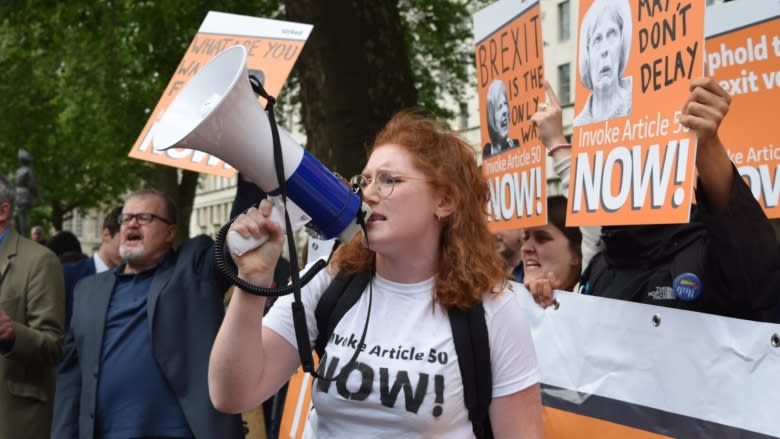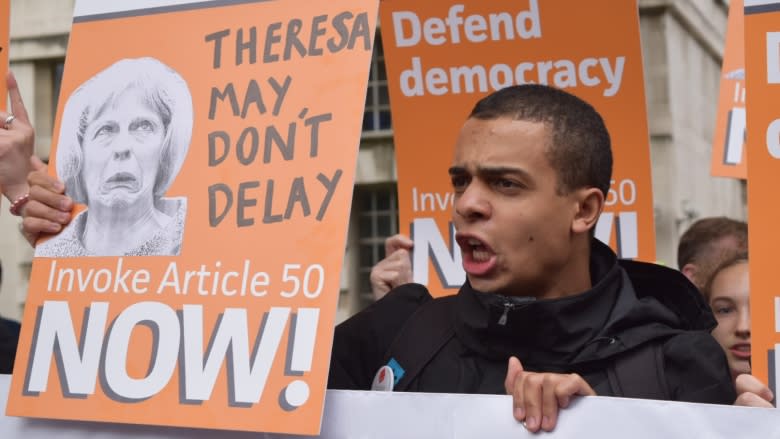It wasn't racism: Young Brexiteers say economy, EU control more important than immigration
Outside the gates of 10 Downing Street, Ella Whelan was brandishing a megaphone when Theresa May was walking into her new home as Britain's prime minister for the first time.
"Theresa May, don't delay, invoke Article 50 today," the 24-year-old cried, with about two dozen placard-wielding Brexiteers behind her.
They were urging May to invoke the article of the Lisbon Treaty that would trigger Britain's withdrawal from the European Union. Hardly any looked older than 30.
But aren't British millennials supposed to be heartbroken by Brexit?
Pollsters concur the majority of young people voted in the June 23 referendum to remain in the EU. Spurned young Remainers flooded the Guardian with letters and protested outside Parliament the day after the vote.
Still, there are some millennials on the other side and they're experiencing a frustration of their own these days.
According to Ipsos MORI, 25 per cent of 18- to 24-year-olds said they were likely to vote to leave. The International Centre for Electoral Psychology at the London School of Economics found 29 per cent of 18- to 24-year-olds voted to leave in their post-referendum survey.
Now, these young Brexiteers find themselves caught in an unwanted perception that they voted to leave the EU over concerns about immigration — a view that has come both from the Leave campaign's push to limit immigration and reports of people telling minorities they need to leave now that Britain has voted out.
"We've all been called racists, bigots, idiots and worse over the last three weeks," Whelan said, speaking about online comments to staff at her pro-Leave magazine, Spiked. "But Spiked believes in free speech. Bring it on."
Her friends were also displeased with her.
"You don't get the 'You horrible racist,' " she said. "But you get the 'You're voting for racism' … they can't quite believe it."
Louis Trupia, a second-year Oxford University student, says accusations of racism drown out the reasons young voters wanted out.
"It was very infuriating when, for a lot of people, this wasn't even a vote about immigration," Trupia said. "It also stopped some people from coming out publicly and saying they were in favour of Brexit."
Border worries
Leave voters as a whole listed controlling borders as their most pressing concern leading up to the referendum, according to IpsosMORI. But priorities switched when analysts looked at young voters.
Young people's "top issue was the economy and they were less likely to mention immigration," said Gideon Skinner, head of political research at Ipsos MORI.
Michael Bruter, an electoral psychology analyst at the LSE, said 18- to 29-year-olds who voted to leave listed their top concern as excessive regulation. Immigration came second.
But immigration was a hard topic to avoid in the days before the referendum. A poster unveiled by Leave campaigner Nigel Farage, depicting a mass of non-white migrants supposedly seeking entry to Britain via the EU, quickly ignited a backlash claiming it incited racial hatred.
Whelan, however, said the racist Leave voter stereotype doesn't describe her.
She supports open borders. She thinks U.K. independence will allow Britain to be more migrant-friendly, though May, who wants to reduce net immigration to below 100,000 annually, probably won't make that happen, Whelan said.
"I think Remain really tapped into that feeling of, like, you're wrong, you're stupid, you're racist. That kind of social pressure."
Jordan Romero-Bowers, 26, says he voted Leave so Eurozone "bankruptcy" wouldn't weigh down his young son's future. He thinks immigration is good for the British economy — Romero-Bowers himself works in Aberdeen's oil industry but was born in Spain.
But he's received backlash from his colleagues in Scotland, an area that voted heavily to remain
"People stopped talking to me," he said. They said: 'How dare you, you're Spanish. You come to this country, take our nationality and vote to leave?' "
Romero-Bowers says he was also a target of what he thinks was xenophobia from an older Leave supporter while he was riding a bus.
"It was a drunk guy … as soon as he heard my accent, he started [saying] 'get f--king out.'"
Romero-Bowers was far from the only one told to "get out" following the Brexit vote. Hate crime reports increased by 57 per cent in the days following the referendum, according to the National Police Chief's Council.
But Louis Trupia, the Oxford student who argued students should back Brexit, says framing Leave voters as xenophobes drowned out the real reasons young voters wanted out.
Voting for democracy
Trupia said democracy and sovereignty — not immigration — were the reasons behind his vote.
"I just believed that the EU was an anti-democratic organization and it was frequently ruling against the rule of the British people," he said.
Trupia isn't the first to suggest the EU has a democratic deficit. The number of European Parliament seats has increased since the EU's inception and Britain's voting clout hasn't kept up.
According to a report from Business for Britain, the country held 20 per cent of seats in EU Parliament in 1979; it now holds 9.5 per cent.
Outpouring of emotion
Despite the EU's flaws, young Remainers have taken to the streets with their grief over Brexit.
Whelan finds this outpouring of emotion concerning.
"Many young people who voted Remain have treated this like the breakup of a personal relationship," she says.
She thinks the way young Remainers have treated the old is even worse — referring to social media posts suggesting seniors not be allowed to vote.
"That's just disgusting … it's the older people who… will actually know more what the EU was about in its origins."
The poll by the London School of Economics' electoral psychology initiative and Opinium that looked at whether youth voted Remain or Leave was conducted between July 5-July 8 2-16. It interviewed 2,002 U.K. adults online
The poll by the London School of Economics' electoral psychology initiative and Opinium that looked at Remain and Leave voters' motivations was conducted between April 22-April 28 2016. It interviewed 3,008 U.K. adults online.
The poll by Ipsos MORI that looked at top issues for voters in the EU referendum was conducted from June 11-June 14 2016. It interviewed 1,257 British adults by telephone.
The poll by Ipsos MORI that looked at how voters planned to vote in the referendum interviewed 1,592 British adults by telephone between June 21-22.




